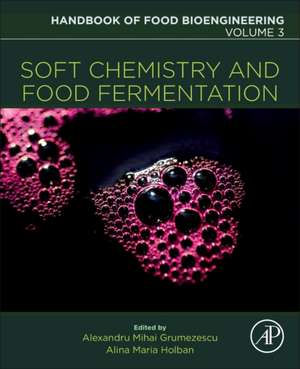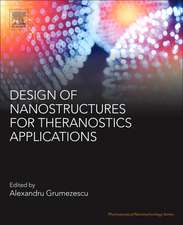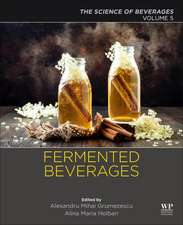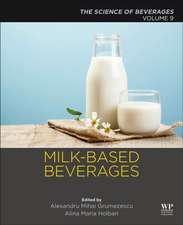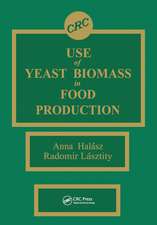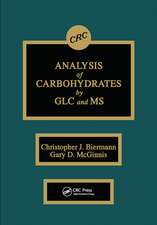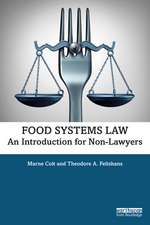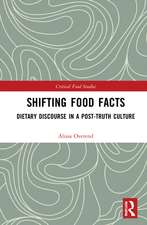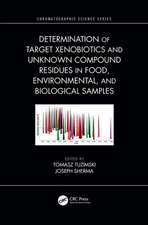Soft Chemistry and Food Fermentation: Handbook of Food Bioengineering, cartea 3
Editat de Alexandru Mihai Grumezescu, Alina Maria Holbanen Limba Engleză Paperback – 21 iul 2017
- Includes the most recent scientific progress with proven biological, physical and chemical applications of the food engineering process to understand fermentation
- Presents novel opportunities and ideas for developing and improving technologies in the food industry that are useful to researchers in food bioengineering
- Provides eco-friendly approaches towards components, materials and technologies developed for improvements in food quality and stability
- Includes valuable information useful to a wide audience interested in food chemistry and the bioremediation of new foods
Preț: 696.48 lei
Preț vechi: 765.36 lei
-9% Nou
Puncte Express: 1045
Preț estimativ în valută:
133.27€ • 139.50$ • 110.92£
133.27€ • 139.50$ • 110.92£
Carte tipărită la comandă
Livrare economică 24 martie-07 aprilie
Preluare comenzi: 021 569.72.76
Specificații
ISBN-13: 9780128114124
ISBN-10: 0128114126
Pagini: 548
Dimensiuni: 191 x 235 x 33 mm
Editura: ELSEVIER SCIENCE
Seria Handbook of Food Bioengineering
ISBN-10: 0128114126
Pagini: 548
Dimensiuni: 191 x 235 x 33 mm
Editura: ELSEVIER SCIENCE
Seria Handbook of Food Bioengineering
Cuprins
1. Introduction in soft chemistry and food fermentation
2. Environment-friendly techniques for extraction of bioactive compounds from fruits
3. Bioactivity Profiling of Peptides from Food Proteins
4. A New Class of Pharmabiotics with Unique Properties
5. Aquafeed Formulation using Plant Feedstuffs: Prospective Application of Fish Gut-microorganisms and Microbial Biotechnology
6. Functional Components and Health Benefits of Fermented Soymilk
7. Nanoencapsulation of Spice Oils
8. Comparison of functional properties of cooked and fermented (Rhizopus oligosporus) beans of Canavalia cathartica of the coastal sand dunes
9. Optimized polygalacturonase production in reactor tray type, study of enzymatic extraction and extract application
10. Application of olive oil as nutraceutical and pharmaceutical food: Composition and bio-functional constituents and their roles in functionality, therapeutic and nutraceutical properties
11. Significance of Laccases in Food Chemistry and Related Bioremediation
12. Fermentation to improve food security in Africa and Asia
13. Chemistry of essential oils and influenced factors on their constituents
14. The Role And The Place Of High Performance Liquid Chromatography For The Determination Of Fermented Dairy Products
15. Evolving Status of African (Nigerian) Food Seasoning Agents Produced by Fermentation
2. Environment-friendly techniques for extraction of bioactive compounds from fruits
3. Bioactivity Profiling of Peptides from Food Proteins
4. A New Class of Pharmabiotics with Unique Properties
5. Aquafeed Formulation using Plant Feedstuffs: Prospective Application of Fish Gut-microorganisms and Microbial Biotechnology
6. Functional Components and Health Benefits of Fermented Soymilk
7. Nanoencapsulation of Spice Oils
8. Comparison of functional properties of cooked and fermented (Rhizopus oligosporus) beans of Canavalia cathartica of the coastal sand dunes
9. Optimized polygalacturonase production in reactor tray type, study of enzymatic extraction and extract application
10. Application of olive oil as nutraceutical and pharmaceutical food: Composition and bio-functional constituents and their roles in functionality, therapeutic and nutraceutical properties
11. Significance of Laccases in Food Chemistry and Related Bioremediation
12. Fermentation to improve food security in Africa and Asia
13. Chemistry of essential oils and influenced factors on their constituents
14. The Role And The Place Of High Performance Liquid Chromatography For The Determination Of Fermented Dairy Products
15. Evolving Status of African (Nigerian) Food Seasoning Agents Produced by Fermentation
